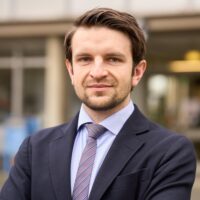AGI News
Iulian Romanyshyn, DAAD/AGI Research Fellow


Iulian Romanyshyn
University of Bonn
Dr. Iulian Romanyshyn is a DAAD/AGI Research Fellow in Fall 2025.
Dr. Iulian Romanyshyn is a senior fellow and lecturer at the Center for Advanced Security, Strategic and Integration Studies (CASSIS) at the University of Bonn. He is also the head of the scientific program at the Institute for International Cooperation, Technological Diplomacy and Communication (ICI) and an advisor at CMI - Martti Ahtisaari Peace Foundation. He previously held research and teaching positions at New York University, Maastricht University, Free University of Brussels, and European University Institute, as well as research fellowships at the NATO Defense College, the Academy of International Affairs NRW, and the Charlemagne Prize Academy. Iulian holds a PhD in political science from the IMT School for Advanced Studies Lucca, master’s and bachelor’s degrees from Maastricht University, College of Europe (Bruges), and the National University of Kyiv-Mohyla Academy.
Iulian’s research focuses on transatlantic security relations, EU security and defense policy, Black Sea security, and EU-Ukraine relations. He has published widely in many peer-reviewed journals, including the Journal of Common Market Studies, International Journal, Journal of European Integration, European Foreign Affairs Review, International Politics, and European Security, and contributed to a number of leading think tanks, including the Atlantic Council, Carnegie Europe, and the German Institute of Development and Sustainability. Iulian's research has been acknowledged with the Global Strategy PhD Prize awarded by the Egmont Institute for International Relations and the European Security and Defence College.
Iulian’s research project at AGI will focus on the question of security guarantees for Ukraine. Based on the concept of sufficient deterrence, he explores a series of measures that will allow Ukraine to build a sufficient capacity to defend against Russia’s ongoing war to the point that Russia is deterred from repeating its aggression in the future. In addition, the project examines how the push to provide security guarantees for Ukraine recalibrates the transatlantic burden-sharing and redefines the relations between the United States and Europe in security and defense.
AGI is pleased to welcome Dr. Iulian Romanyshyn as a DAAD/AGI Research Fellow in Fall 2025.
Dr. Iulian Romanyshyn is a senior fellow and lecturer at the Center for Advanced Security, Strategic and Integration Studies (CASSIS) at the University of Bonn. He is also the head of the scientific program at the Institute for International Cooperation, Technological Diplomacy and Communication (ICI) and an advisor at CMI – Martti Ahtisaari Peace Foundation. He previously held research and teaching positions at New York University, Maastricht University, Free University of Brussels, and European University Institute, as well as research fellowships at the NATO Defense College, the Academy of International Affairs NRW, and the Charlemagne Prize Academy. Iulian holds a PhD in political science from the IMT School for Advanced Studies Lucca, master’s and bachelor’s degrees from Maastricht University, College of Europe (Bruges), and the National University of Kyiv-Mohyla Academy.
Iulian’s research focuses on transatlantic security relations, EU security and defense policy, Black Sea security, and EU-Ukraine relations. He has published widely in many peer-reviewed journals, including the Journal of Common Market Studies, International Journal, Journal of European Integration, European Foreign Affairs Review, International Politics, and European Security, and contributed to a number of leading think tanks, including the Atlantic Council, Carnegie Europe, and the German Institute of Development and Sustainability. Iulian’s research has been acknowledged with the Global Strategy PhD Prize awarded by the Egmont Institute for International Relations and the European Security and Defence College.
Iulian’s research project at AGI will focus on the question of security guarantees for Ukraine. Based on the concept of sufficient deterrence, he explores a series of measures that will allow Ukraine to build a sufficient capacity to defend against Russia’s ongoing war to the point that Russia is deterred from repeating its aggression in the future. In addition, the project examines how the push to provide security guarantees for Ukraine recalibrates the transatlantic burden-sharing and redefines the relations between the United States and Europe in security and defense.








